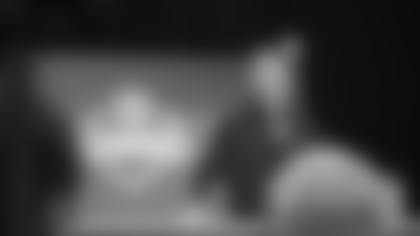Willie Anderson, the greatest right tackle of the turn-of-the-century NFL, steps into the Bengals Ring of Honor Thursday night carrying the torch that has been passed along the royal line of the Bengals offensive line.
Or maybe "The Club," is a better name for it.
That's the name his line coach, Paul Alexander, gave Anderson's pioneering technique. The one he passed on to a rookie drafted a decade after him. That kid from LSU, Andrew Whitworth, now in his first year of retirement, just happens to be at Paycor Stadium as a member of the Amazon crew streaming Thursday's game (8:15 p.m.-Cincinnati's Channel 9) against the Dolphins.
In a Ring of Honor irony, it was Anderson's voice from the 2006 rookie season that blared into Whitworth's helmet for that last reach-down-into-your-guts drive of his career in the last Super Bowl. Down four points to, of all teams, the Bengals of Big Willie, Big Whit, Anthony and Joe Walter, Whitworth knew this was it.
From his Rams own 21 with 6:13 left in 16 seasons.
"Every time I was in that situation, even the Super Bowl, that's the first voice I thought of in my head from when I was a rookie," Whitworth says. " 'Listen dude, ignore everything. The noise, the environment and just block the guy.' He was great at
that. That's one of the things Willie always talked about. Kind of like, 'clear the mechanism,' from Love of the Game. Just block your guy and block out everything else … Being around Willie and just how chill and relaxed he was and how he had a process to every day and every week, broke down rushers week in and week pout … Truly becoming a professional. He taught me how to do that. How to become pro. 'I have a system Monday through Sunday to get to the game.'
"I can always remember Willie teaching me, linemen can't be emotional. You can't react in those moments (when the game is out of hand). You have to see those moments as, 'Hey, I've got my own game I'm playing right now and I'm going to win in this moment.' Really almost check yourself out from the disappointment of being down in the game or up in a game. I just need to be at my best at this moment. Those are things I always thought about throughout my career."
Anderson passed it on because Joe Walter, a 12-year right tackle when Anderson was the 10th pick in the 1996 draft, passed it on to him. It was Walter who followed Anderson into the Spinney Field parking lot after a tough week and commanded, 'Hey Rook, you can't go in the tank, we need you," and Anderson was taking his job.
Walter got it from Anthony Munoz, "the greatest who ever lived," whose No. 78 was one of the first in the Ring befitting a Hall-of-Fame left tackle.
After allowing just 16 sacks in 13 seasons and just one in matchups with 10 of the league's top 16 all-time rushers, Anderson is destined to follow Munoz to Canton, too.
"When I went to the Ravens, they were amazed that I shared so much information," says Anderson of that final season in 2008. "I guess their vets didn't do that. But that's the way our room was. I was probably like that because Joe was like that with me. And I was with the same team and had the same (line) coach and when you see a guy who can be special, a guy like Whitworth, you're glad you could make an impact."
It wasn't just Whitworth. It was Levi Jones and Eric Steinbach and Stacy Andrews. It also just wasn't football. It was taking care of your body and Whitworth listened as he became the first offensive lineman to start a Super Bowl at age 40. He saw how much time Anderson devoted to his body.
"That's what successful people do," Anderson says. "They listen to other successful people."
Whitworth can remember Anderson watching a vignette unspool in that rookie training camp. A group of some of the more adventurous players approached Whitworth about joining them on an upcoming off day they promised to be filled.
"He could tell by the look on my face I didn't know they did that stuff in the league," Whitworth says. "I told them no, I was good. I think when Willie saw that, he knew I was the real deal. I was from the SEC, just like Willie, and he knew I was a good old boy just trying to make it."
After Whitworth turned them down, he remembers Anderson looking at him sitting in his locker and saying, "Hey Rook, you're not in the south anymore, are you buddy?"
Anderson was 20 when the Bengals drafted him, 21 when he got to training camp and at that point one of the youngest players ever to come out of college. He was amazed in the team meeting room to see Walter surrounded by notebooks.
"He had notebooks from the freaking '80s," Anderson says. "He said, 'I keep notes on all the guys I face.' In college, you'd face different guys every year. I'm wondering why he's writing everything down. My dumb ass. I started to sit next him and copy his stuff."
Anderson didn't have the notebooks, but he had a brilliant knack for watching film and cataloging it in his own vault. He's still a walking scouting report. At the Willie Anderson Offensive Line Academy, he's taught the kids technique that Walter taught him.
"When I say, 'Grab the ground,' they see my toes actually gripping the ground," Anderson once told Bengals.com. "And I learned that from Joe Walter. I was so afraid of speed rushers and Joe would say by putting his (front) foot in the ground and digging that foot in the ground, that's telling me that's my anchor leg."
But as he goes into the Ring he reflects how the game changed around him and he couldn't rely on some of the things Walter had introduced.
No longer was he facing guys who played his like idol, the brutally strong Reggie White, a Hall-of Famer he blanked in their one meeting in 1998. It became guys like the NBAish Julius Peppers spinning like a post player. Then by the time Whitworth arrived in the second round in 2006, they were guys like the 6-2 track man Robert Mathis.
"I couldn't do what I was doing in the '90s," Anderson says.
With the help of Alexander and an injured hand, Anderson developed his very own technique, one that he calls "independent hands."
"I was the first one to do it. Paul was the first one to coach it," Anderson says. "No punches. One hand high, one hand low. The upper hand. The lower hand."
"The Club."
"Don't punch. You double under the bull rush," Anderson says. "We taught it to Whit. And he added on to it in his own version. What we did in the early 2000s, he dominated with it in the 2010s. He blocked (James) Harrison every year doing it.
"The punch could put you in a bad position. But you watch Whit, even at 40, he could still move and control his body because of the technique. "
Whitworth emulated how Anderson always seemed make sure he used the foe's body against him.
"Key to maintaining balance and leverage through the set," says Whitworth of independent hands. "Too many guys throw two hands, which causes them to lean."
Whitworth, who won a Super Bowl with the words from the Bengals Ring of Honor ringing in his ears, is grateful for the technique tips and the coaching.
But there is something else even as he talks into a microphone instead of a huddle.
"I can pull you up tape of Hall-of-Famers, great players, you name it," Whitworth says. "When they were on bad teams in bad situations, they did not play like Hall-of-Famers and great players. Willie Anderson was at his best every week regardless of where his team was. I learned how to be tough and resilient and just trust my process from Willie."
The Club has been passed.






